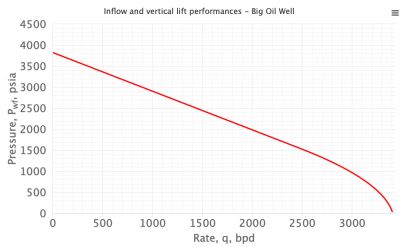Difference between revisions of "IPR"
From wiki.pengtools.com
(→See also) |
(→See also) |
||
| (26 intermediate revisions by the same user not shown) | |||
| Line 3: | Line 3: | ||
[[File:Inflow Performance Relationship.png|thumb|right|400px|link=https://www.pengtools.com/pqPlot|Inflow Performance Relationship Curve]] | [[File:Inflow Performance Relationship.png|thumb|right|400px|link=https://www.pengtools.com/pqPlot|Inflow Performance Relationship Curve]] | ||
| − | [[IPR]] is | + | [[IPR | Inflow Performance Relationship]] is a curve of producing rates plotted against well bottomhole pressures for oil, water and gas wells<ref name= Vogel/>. |
| − | [[IPR]] curve shows productive capacity and performance | + | [[IPR]] curve shows productive capacity and well performance. |
| − | [[IPR]] curve is used in Nodal Analysis for production systems design, analysis and optimization. | + | [[IPR]] curve is used in [[Well Nodal Analysis]] for production systems design, analysis and optimization. |
==Math and Physics== | ==Math and Physics== | ||
===Oil well IPR equation=== | ===Oil well IPR equation=== | ||
| − | *[[Darcy's law]] | + | *[[Darcy's law]] equation for the single-phase flow of incompressible liquid: |
:<math> q = \frac{kh}{141.2 B \mu}\ (\bar{P} - P_{wf}) J_D</math> | :<math> q = \frac{kh}{141.2 B \mu}\ (\bar{P} - P_{wf}) J_D</math> | ||
| − | *[[Vogel IPR]] two phase equation (oil + gas) | + | *[[Vogel's IPR]] two-phase flow equation (oil + gas) and it's combination with single phase liquid. |
| − | *[[Composite IPR]] three phase equation (oil + gas + water) | + | *[[Composite IPR]] curve for oil wells producing water. |
| + | *[[3 Phase IPR]] three-phase flow equation (oil + gas + water). | ||
===Gas well IPR equation === | ===Gas well IPR equation === | ||
| Line 46: | Line 47: | ||
:<math> \mu </math> = viscosity, cp | :<math> \mu </math> = viscosity, cp | ||
| − | + | == References == | |
| + | <references> | ||
| + | <ref name=Vogel>{{cite journal | ||
| + | |last1= Vogel |first1=J. V. | ||
| + | |title=Inflow Performance Relationships for Solution-Gas Drive Wells | ||
| + | |journal=Journal of Petroleum Technology | ||
| + | |volume=20 | ||
| + | |number=SPE-1476-PA | ||
| + | |date=1968 | ||
| + | }}</ref> | ||
| + | |||
| + | </references> | ||
==See also== | ==See also== | ||
| + | :[[Well Nodal Analysis]] | ||
:[[141.2 derivation]]<BR/> | :[[141.2 derivation]]<BR/> | ||
:[[Darcy's law]]<BR/> | :[[Darcy's law]]<BR/> | ||
:[[JD]]<BR/> | :[[JD]]<BR/> | ||
:[[Production Potential]] | :[[Production Potential]] | ||
| + | :[[Vogel's IPR]] | ||
| + | :[[Composite IPR]] | ||
| + | :[[3 Phase IPR]] | ||
{{#seo: | {{#seo: | ||
| Line 58: | Line 74: | ||
|titlemode= replace | |titlemode= replace | ||
|keywords=Inflow Performance Relationship, nodal analysis, IPR curve, IPR calculator | |keywords=Inflow Performance Relationship, nodal analysis, IPR curve, IPR calculator | ||
| − | |description=IPR curve | + | |description=IPR curve formula for well performance. |
}} | }} | ||
| + | |||
| + | [[Category:PQplot]] | ||
| + | [[Category:pengtools]] | ||
Latest revision as of 13:08, 7 April 2025
Contents
Inflow Performance Relationship
Inflow Performance Relationship is a curve of producing rates plotted against well bottomhole pressures for oil, water and gas wells[1].
IPR curve shows productive capacity and well performance.
IPR curve is used in Well Nodal Analysis for production systems design, analysis and optimization.
Math and Physics
Oil well IPR equation
- Darcy's law equation for the single-phase flow of incompressible liquid:
- Vogel's IPR two-phase flow equation (oil + gas) and it's combination with single phase liquid.
- Composite IPR curve for oil wells producing water.
- 3 Phase IPR three-phase flow equation (oil + gas + water).
Gas well IPR equation
- Darcy's law gas inflow equation:
- C and n equation
IPR calculator software
- PQplot nodal analysis software is used to calculate the IPR curves. PQplot is available online at www.pengtools.com.
- Excel
- other
Nomenclature
 = formation volume factor, bbl/stb
= formation volume factor, bbl/stb = dimensionless productivity index, dimensionless
= dimensionless productivity index, dimensionless = permeability times thickness, md*ft
= permeability times thickness, md*ft = average reservoir pressure, psia
= average reservoir pressure, psia = average reservoir pseudopressure, psia2/cP
= average reservoir pseudopressure, psia2/cP = well flowing pressure, psia
= well flowing pressure, psia = average well flowing pseudopressure, psia2/cP
= average well flowing pseudopressure, psia2/cP = flowing rate, stb/d
= flowing rate, stb/d = gas rate, MMscfd
= gas rate, MMscfd = temperature, °R
= temperature, °R
Greek symbols
 = viscosity, cp
= viscosity, cp
References
- ↑ Vogel, J. V. (1968). "Inflow Performance Relationships for Solution-Gas Drive Wells". Journal of Petroleum Technology. 20 (SPE-1476-PA).



